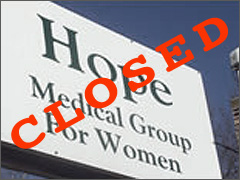
If it seems like there have been a lot of abortion clinics that have closed in the past year, that’s because there have been.
Per Jill Stanek, Operation Rescue notes that in the past year, 31 abortion facilities have closed [PDF]. (Nine new ones have since opened, for a net loss of 22.)
In 1991, there were almost 2,200 abortion clinics in the U.S. Today, the number stands at 689.
The reasons these for the spate of closures this past year are varied. Some have closed because the resident abortionist ran afoul of the law.
Others saw the handwriting on the wall and surrendered their medical license before the state could revoke it.
And let us certainly not forget the power of prayer in closing abortion clinics.
One other reason some abortion clinics have closed: they’re being muscled out by Planned Parenthood.
The Wal-Mart of the Abortion Industry
Recently on The Abortioneers (a group blog whose contributors all work in the abortion industry), a writer who goes by the name About a Girl addressed this issue in the context of discussing the recent closing of the independently owned Cedar River abortion clinic in Yakima, Washington.
She begins by posing a few questions for her fellow abortion industry cohorts:
We need to expand access to abortion services. We all know this. So, the question may now be, within our own Abortionland, what exactly does expanded access mean? How can abortion access expand without crushing little, struggling clinics? Is it even possible for different service delivery models (hospitals, Planned Parenthood, etc.) to expand without hurting independent clinics? And if possible (which I believe it, of course, is), is it realistic? Will providers set aside competition for altruism (increased access)?
Later, About a Girl observes:
It seems like there is this clear divide, an us versus them between some independent clinics and Planned Parenthood.
Indeed, many smaller abortion clinics have expressed just such sentiments.
She goes on to say, if only for the sake of argument:
Let’s say the independent clinics out there are right: Planned Parenthood plays a role in closing down little clinics (not intentionally, I’m sure) [emphasis added].
To speculate that Planned Parenthood would even consider “set[ting] aside competition for altruism” and to surmise that any role PP may have in closing down smaller abortion clinics is surely “not intentional” is hopelessly naive.
Planned Parenthood makes money — and lots of it — by doing abortions. From their standpoint, why on earth would they not want to continually increase their slice of the pie?
It would be just as daft to believe Budweiser would ever consider “setting aside competition” to allow microbreweries more access to the American beer market as it would be to believe Planned Parenthood would do the same in relation to smaller competitors in the abortion market — or that any role PP plays in closing down their smaller competitors is anything but unintentional.
After all, Steve Trombley (former CEO of PP Illinois and current CEO of PP of Northern New England) famously said he likes to think of Planned Parenthood as “the LensCrafters of family planning.” And you don’t get to be the leading chain in a nationwide industry without driving out local competition.
The Difference Between the Pro-Life Movement and the Abortion Industry
This “us versus them” divide that exists within our opposition illustrates a major difference between the abortion industry and the pro-life movement. When we hear about a new pro-life organization getting started, or about the growth of an already established organization, we couldn’t be happier.
As pro-life organizations, we don’t see other pro-life organizations — even those in the same geographical area — as competitors, but as allies united in a common struggle against abortion.
Abortion clinics, however, cannot say the same about their view of other abortion clinics.
